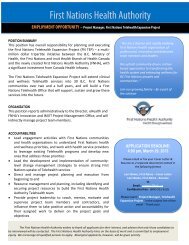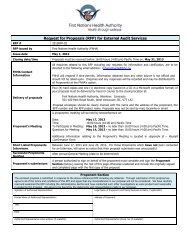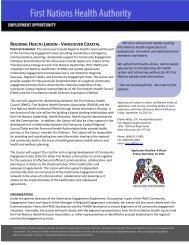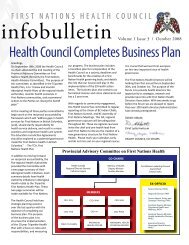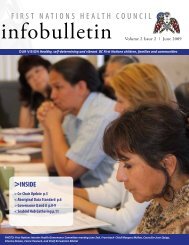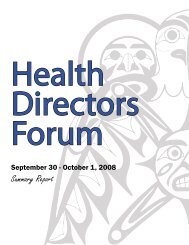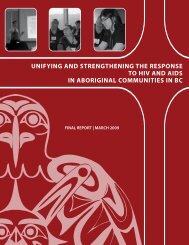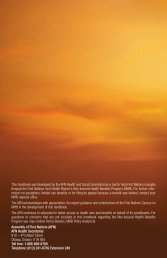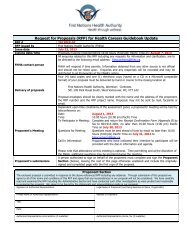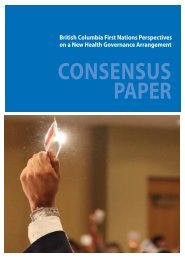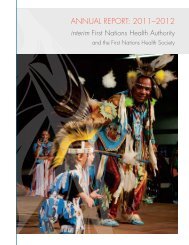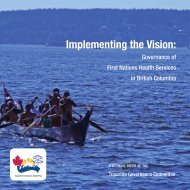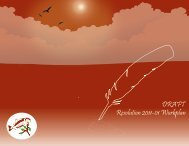pdf download - First Nations Health Council
pdf download - First Nations Health Council
pdf download - First Nations Health Council
Create successful ePaper yourself
Turn your PDF publications into a flip-book with our unique Google optimized e-Paper software.
CLOSING KEYNOTE SPEAKER<br />
Dr. Martin Brokenleg, Professor of <strong>First</strong> <strong>Nations</strong><br />
Ministry and Theology,<br />
Vancouver School of Technology<br />
“If we plan to be whole we have to stop<br />
looking at woundedness and instead focus on<br />
wholeness.”<br />
“<strong>First</strong> <strong>Nations</strong> include spirituality in everything<br />
that they do. Most groups back away from<br />
spirituality, but not Native people, because<br />
spirituality is their fundamental strength.”<br />
“Belonging is so powerful that it will heal any<br />
wounds you’ve been carrying with you and will<br />
give you the courage to walk through fire if<br />
necessary. All of us feel on the inside the power<br />
that belonging has – it creates strength and<br />
energy.”<br />
“Mastery creates strength of spirit. It is not just<br />
getting something done, but discovering what<br />
you can do.”<br />
Dr. Brokenleg shared that the median age in<br />
native communities was typically between the ages<br />
of 12 and 14 years old, with 50% of the population<br />
being older and 50% of the population being<br />
younger. In Saskatoon and Regina public schools,<br />
60% of the children were Aboriginal.<br />
Dr. Brokenleg discussed the Circle of Courage<br />
psychology for dealing with youth and adults,<br />
noting that in order to be whole, it was necessary<br />
to stop looking at woundedness and to instead<br />
focus on wholeness. He shared that fundamentally,<br />
culture was in place not lost, although it could<br />
take some work to find it and dig it out again. He<br />
emphasized that in looking at the <strong>First</strong> <strong>Nations</strong>’<br />
wellness legacy over thousands of years, the last<br />
200 years lost their importance.<br />
An overview of an Aboriginal childcare<br />
philosophy taken from the green book “Reclaiming<br />
Youth at Risk” provided best practices for working<br />
with kids, using four spiritual strengths that existed<br />
in all Aboriginal communities: belonging, mastery,<br />
independence, and generosity.<br />
Belonging was the need to be significant<br />
and important – like the killer whales that were<br />
always in pods. In Sioux culture there were no<br />
clans or crests, but there were relatives that did<br />
everything together. For example, Dr. Brokenleg<br />
shared that hospitals in South Dakota dropped<br />
the requirement for native patients to limit their<br />
number of visitors. He spoke of the reality that a<br />
baby crawling on the floor in a room of strangers<br />
would crawl directly to its mother. Babies were<br />
designed to belong. In fact, regardless of their age,<br />
everyone wanted to belong.<br />
Dr. Brokenleg discussed his icons of belonging,<br />
which were his mother and father who married on<br />
may 1, 1937. To celebrate 60 years together, they<br />
invited the community to witness them renew<br />
their vows. They fed 4,000 people and asked for<br />
no gifts or money. Five months later on a Friday<br />
afternoon, Dr. Brokenleg was beside his father<br />
when he suffered a stroke and right side paralysis.<br />
When his mother arrived and called his father<br />
by her special name for him he smiled, and then<br />
closed his eyes. He lingered six more days. There<br />
were 70 people there when he took his last breath.<br />
Dr. Brokenleg shared that when a parent died,<br />
the whole world seemed to change. Two hours<br />
after his father died, his mother said that she was<br />
also ready to go. She was miserable for five more<br />
months and then they buried her as well.<br />
It was observed that schools typically<br />
responded to those in difficulty with “unbelonging”<br />
or “time outs”. Other groups however,<br />
accepted people when they were ‘going down in<br />
flames’, because they knew that nothing happened<br />
13<br />
VANCOUVER, bC • mAY 20 - 21 , 2008



